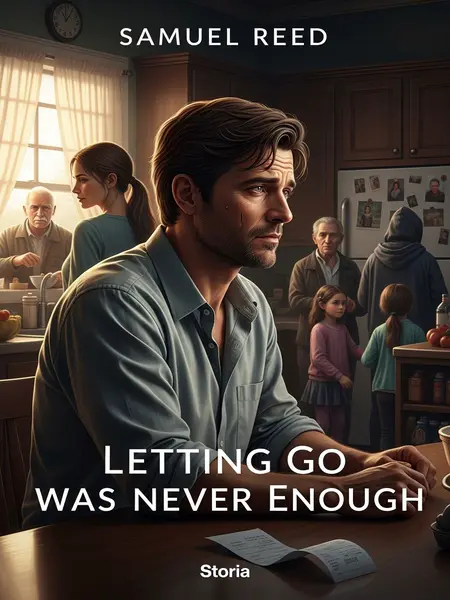Chapter 4: Showdown on Main Street
This time around,
I wasn’t just going out West—I was leaving both of those ungrateful kids for Lillian to handle. No more playing the martyr.
I stuffed clothes into a duffel, grabbed my work boots, tossed in the invitation. I moved fast, afraid I’d lose my nerve if I stopped to think. For once, I was putting myself first.
She wants to take Mark and his two kids to work with her?
Ha! Not a chance! Let her try juggling everyone’s problems for a change. I was done being the safety net.
After packing, I carried my daughter next door.
She clung to my neck, sleepy and warm, her hair tickling my cheek. I kissed her forehead, whispered that everything would be okay. God, I hoped I was telling the truth.
The moment I stepped into Mark’s house, the smell of bacon frying hit me.
It was rich, salty, mouthwatering—a luxury we hadn’t tasted in months. I glanced around at the clean floors, the fresh flowers on the table, the laughter drifting in from the living room. It all looked so easy for them.
A widower with no job and no income, yet he could always afford bacon and new clothes—of course, all thanks to my wonderful wife, Lillian. Must be nice, huh?
I spotted Mark’s son in the hallway, dressed in a crisp new shirt, his shoes shining. A new coat hung by the door, tags still on. Once you noticed, it was all so obvious.
In my past life, I always felt that if Lillian owed her brother-in-law anything, then I owed him too.
I convinced myself it was right, that family meant sacrifice. I let guilt steer my choices, let Mark’s needs outweigh my own. It was easier than admitting how much it hurt.
So even though I was never comfortable with her constantly sending our money to Mark, I never really confronted her about it.
I’d bring it up in passing, but she’d brush it off, tell me I was overreacting. I learned to keep quiet, to swallow my pride, to accept that things would never change.
But what did that get me? A lifetime of scraping by, while she lived the good life with Mark, enjoying every comfort.
I watched from a distance, wondering when it became normal for me to be left behind. I started to resent the smell of bacon, the sound of laughter, the sight of new clothes I couldn’t afford. I was done.
I carried my daughter outside and saw Mark chatting with a few neighbors at the street corner.
He was holding court, waving his hands as he told a story, the neighbors laughing at every punchline. He looked comfortable, at ease, like he belonged. Did he ever think about how he got there?
Mark was wearing a crisp new blue shirt and black slacks, his hair slicked back.
He looked like he’d just stepped out of a magazine ad for suburban dads. There was a confidence in his stride, a smugness in his smile, that made my skin crawl.
If you didn’t know better, you’d think he was a schoolteacher.
He had that polished look, the kind that made people trust him, made them think he was someone important. It was all an act, but it worked.
Ever since my sister died, he stopped working too, living large off the money Lillian sent him.
He always had a new excuse for why he couldn’t get a job, always some story about bad luck or unfair bosses. But as long as the checks kept coming, he never seemed too worried.
When he saw me coming with my daughter, Mark hesitated, then said, “Sam.”
His voice was careful, measured, like he was testing the waters. He glanced at the neighbors, then back at me, waiting to see how I’d react.
In my past life, at first I didn’t want to talk to him.
I’d avoid him at the mailbox, pretend not to see him at the grocery store. It was easier than pretending everything was fine.
Later, I hated him.
I couldn’t stand the sight of him, the sound of his voice, the way he always seemed to come out on top. I’d lie awake at night, replaying every slight, every missed opportunity, every time he took what was meant for me.
I hated how he latched onto Lillian like a vine, sucking away everything meant for me and my kids.
He was always there, always in the background, always taking just a little more than he gave. It was like he couldn’t help himself, like he believed the world owed him something.
I gave up the hard-won spot at State Agricultural College for Lillian’s dreams.
I’d worked for years, pulled double shifts, studied by flashlight, all for a chance to make something of myself. And I gave it all up without a fight.
And what did I get in return?
Nothing but empty promises and a lifetime of regret.
Mark probably knew how I felt, so even though we lived next door, we barely ever saw each other.
He’d keep his distance, make himself scarce whenever I was around. It was like we had an unspoken agreement to pretend everything was normal.
I looked Mark up and down, but said nothing.
I let the silence hang, heavy and uncomfortable. The neighbors shifted, sensing something was off, but no one said a word.
Even the neighbor ladies perked up.
Mrs. Jenkins from across the street peered over her glasses, whispering to Mrs. Carter about the scene unfolding on the sidewalk. Small towns have long memories, and gossip spreads fast.
“Sam, what’s going on with you today?”
Mrs. Jenkins’s voice was sharp, but friendly in that nosy-neighbor way. She’d always had a soft spot for my kids, used to bring over cookies when they were little. “You look like you’re ready to start a brawl, honey.”
“Yeah, why are you looking at Mark like that?”
Mrs. Carter chimed in, arms crossed, eyes narrowed. She’d never liked Mark much, and I could tell she was itching for a reason to take my side. “You two finally gonna settle something?”
I pressed my lips together, then looked at Mark.
I took a breath, steadying myself. This was it—the moment I stopped letting things go.
“Did Lillian send you more food stamps and vouchers?”
My voice was calm, but with an edge. I wanted everyone to hear, to know what was really going on.
The moment I asked, Mark’s face changed.
He paled, eyes darting to the neighbors, then back to me. He opened his mouth, closed it, tried to smile like nothing was wrong.
“S-Sam…”
His voice was shaky, the confidence gone. He looked like a kid caught red-handed.
The neighbors stared at me, then at Mark.
The silence stretched, everyone waiting to see what would happen next. I could feel their eyes on me, but I didn’t back down.
My face went cold. “My kids haven’t had a bite of meat in two months. I just smelled bacon frying at your place. Did Lillian send you more food stamps and vouchers?”
Mark’s panic was written all over him.
He shifted from foot to foot, hands twisting. He glanced at the neighbors, then at the ground, searching for an excuse.
“N-no, I, uh… I borrowed it from Mom…”
He stammered, his story falling apart before he even finished. The neighbors exchanged looks, not buying it for a second.
I scoffed. “But someone saw a letter from Lillian to you.”
I let the accusation hang in the air, daring him to deny it.
I paused. “Two letters every month.”
That got the neighbor ladies’ attention.
Mrs. Jenkins’s eyebrows shot up, Mrs. Carter let out a low whistle. People started murmuring, the tension crackling like static.
Actually, it was much later that I learned Lillian did send me food, meat, even money vouchers.
The truth came out in pieces, long after it mattered. I pieced it together from old receipts, half-remembered conversations, stories from neighbors who’d seen more than they let on.
But she thought if she sent them to me directly, Mark would feel too embarrassed to take any.
She always tried to spare his pride, to make things easier for him—even if it made things harder for me. I never understood why she cared so much about his feelings and so little about mine.
So she sent all the vouchers to Mark first, then had him pass them to me.
It was a system built on trust, and Mark took full advantage. I was always the last to know, scrambling to catch up. Figures.
Except he never did.
He kept everything for himself, never once thinking about the kids going hungry next door. It was easier to look the other way, to pretend it wasn’t his problem.
My sister’s been gone three years.
Three long years of doing without, of watching someone else live the life I should’ve had. I’d stopped expecting things to get better.
For those three years, Lillian sent money and vouchers to him every month.
Never missed a payment, never forgot a birthday or holiday. Mark’s kids never went without, and everyone thought it was because he was such a good father. I knew better.
But I, her legal husband, never saw a cent.
I was left to scrape by, to make excuses, to pretend I didn’t mind. But I did. God, did I ever.
Mark never thought I’d find out.
He was so sure of himself, so certain I’d never make a scene. He underestimated how much I’d changed.
In his mind, even if I did, my pride would keep me from ever coming to him.
He thought I’d be too ashamed, too beaten down to stand up for myself. He was wrong.
Because if I did, it meant I was admitting I mattered less to Lillian than he did.
That was the hardest part—realizing I’d always been second best. Hurts, doesn’t it?
Because, just look:
I was her husband, but she only cared about Mark.
It was a truth I’d tried to ignore, but it was plain as day now. I wasn’t going to let it go this time.
He never expected I’d actually confront him.
I saw the shock in his eyes, the panic rising as he realized I wasn’t backing down. It felt good, in a twisted way, to finally have the upper hand.
I didn’t care what went on between Mark and Lillian.
Their secrets were theirs to keep. All I wanted was what was rightfully mine.
But what was mine, I was taking back—every last penny.
I’d spent too long giving up, letting things slide. Not anymore.
I’d given up everything for this family these years—caring for the house, the kids, even my brother-in-law’s parents. No more.
I’d had enough.
The anger burned in my chest, fueling every word. I wasn’t going to be silent anymore.
I didn’t give him a chance to make excuses—I just kept going: “I know for the past three years since my sister died, Lillian’s been sending you money and vouchers every month, and you never gave me a single one.”
My voice was steady, but there was no mistaking the accusation. The neighbors leaned in, hungry for the drama.
Mark looked at me, about to speak, but I cut him off.
I raised a hand, shutting him up before he could spin another lie. I wanted the truth, not another story.
“I don’t care what’s going on between you and Lillian, but every voucher that’s mine, you’re going to pay me back in full.”
The words hung in the air, heavy and final. I could see the color drain from Mark’s face.
“Otherwise, I’ll go to the sheriff and report you for welfare fraud!”
It was a bluff—maybe—but it worked. Mark’s eyes went wide, his mouth working like a fish out of water. The neighbors gasped, whispers spreading like wildfire.
Mark actually swayed on his feet. “Sam, it’s not like that, I didn’t—”
He reached out, desperate, but I stepped back, unwilling to listen.
“Didn’t what? You didn’t take Lillian’s vouchers, or you and her aren’t having an affair?”
I let the accusation stand, daring him to deny it. The neighbors shifted, uncomfortable but glued to the scene.
“I don’t care about you two. But the vouchers—you’re giving them all back tonight, or I’ll report you tomorrow.”
I turned to leave, carrying my daughter.
I could feel the eyes on my back as I walked away, but I didn’t look back. For the first time in years, I felt like I was doing something right.
“Hey, Sam! Sam…”
Mark’s voice trailed off, weak and pleading. I ignored him, heading home with my head held high.













